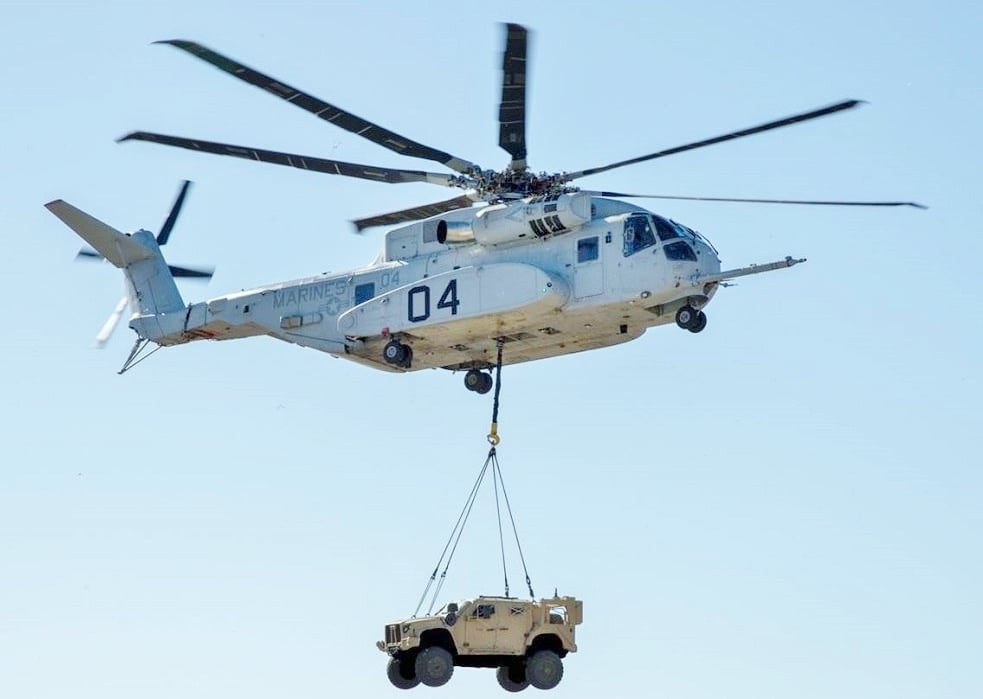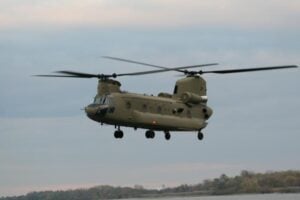CH-53 vs. CH-47: Which Helicopter Will Israel Pick?
Posted on

CH-53K King Stallion lifting a Joint Light Tactical Vehicle (JLTV) in tests.
TEL AVIV: This week, while the votes were being counted in Israeli’s second general election in six months, a small Israeli Air Force delegation has been quietly taking test flights in Patuxent, Maryland aboard the US Marine Corps’ brand-new CH-53K helicopter. Whatever coalition government finally emerges will have some long-delayed defense decisions to deal with, including whether to buy the Lockheed Martin CH-53K King Stallion or Boeing’s CH-47F Block II Chinook.
The Israeli buy of 20 aircraft will be significant, not only in itself, but as a vote of confidence from a key ally that could influence future decisions in the US. Both programs need the boost, in different ways.

CH-47F Chinook
The CH-53K is entering production after a series of embarrassing development problems and delays that caused Congress, at one point, to demand a study of alternative aircraft, although the Marines are passionately committed to the program. By contrast, the Army itself decided to stop buying the CH-47F Block II and transfer funds to higher-priority programs, only to have Congress overrule it. (Both House and Senate appropriators restored the funding, although a final bill has not been passed yet).
Israeli, for its part, needs to replace the early-model CH-53Ds it has used for 50 years. The heavy-duty, long-range transport helicopters are particularly important for IDF’s Depth Command, which conducts special operations far beyond Israeli borders.
While upgrading from Ds to Ks might seem a logical step, the two designs are very different. In fact, the K-model doesn’t use any of the same parts as earlier CH-53s. Hence the importance of the test team — three pilots, one mechanic, and one program manager — sent to Patuxent Naval Air Station to test the first production CH-53K and four pre-production models from the development program. Israeli pilots have even gotten to fly the aircraft, albeit under the watchful eye of a US co-pilot.
“It’s a new platform and we want to test it in different flight envelopes that fit our operational requirements,” an Israeli source told Breaking Defense.
When the team returns to Israel, it will prepare a comprehensive report for the IDF chief of general staff, Gen. Aviv Kochavi, on everything from flight characteristics to long-term sustainment costs.
The Israelis are also looking at the Block II Chinook, which — like the CH-53K — is a new version of a long-serving aircraft. Driven in part by Depth Command’s requirements, the Israelis are looking at a beefed-up version of the CH-47F Block II being built for the Army, one that includes features from the Special Operations MH-47G model such as larger fuel tanks for extended range.
Whether Israel buys the CH-47 or the CH-53, it would modify its aircraft with highly classified Israeli electronics. It would also expect “buy back” clauses in the contract. More politely known as “industrial cooperation,” these deals require foreign companies selling arms to Israel to buy a considerable proportion of their components from Israeli companies.
Such provisions are especially important to Israeli industry now that the US is tightening restrictions on aid, requiring Israel to spend an ever-growing proportion of American Foreign Military Financing (FMF) funds in the US rather than Israel. Buy-back has been a big part of Israel’s participation in the F-35 Joint Strike Fighter program, with prime contractor Lockheed Martin already spending over $1.75 billion with Israeli subcontractors for items ranging from wings to high-tech helmets.
With Turkey now kicked out of the F-35 program, Israel has its eye on components formerly built by Turkish firms. And Lockheed is forging partnerships with Israeli firms on other projects as well. This kind of international cooperation is increasingly the norm.
Whichever firm wins the IDF helicopter contract, Lockheed or Boeing, will have to offer Israeli companies a sizable share of the work.
Subscribe to our newsletter
Promotions, new products and sales. Directly to your inbox.
